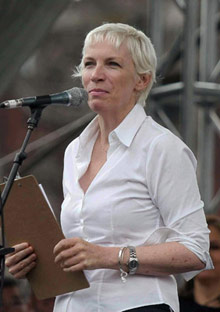Annie Lennox's Aha! Moment

Photo: Victor Chavez/WireImage.com
The singer was aware of the world's ills...but doubted she could really make a difference. Then she met people she could help and came to believe in the power of one.
When I was 16, a job recruiter came to my school in Scotland. He was a white South African who told us of the luxurious lifestyle that could be ours if we moved to his country to teach music. I wondered how he could so casually promise us an easy future in a place devoid of civil rights. Even as a child, I was innately disturbed by the concept of "us" and "them," a separation exemplified by apartheid. A decade later, as members of the Eurythmics, my bandmate Dave Stewart and I—along with other artists—boycotted performances in South Africa, played Rock Against Racism benefits, and donated our South African royalties to the antiapartheid African National Congress.
Still, a part of me thought the world's problems were so vast, so unsolvable, that immersing myself in the battle would be futile. I had never even been to South Africa. It seemed so dark and corrupt, I didn't want to see it.
But in 2003, Nelson Mandela, South Africa's former president, asked me to perform at an AIDS charity concert to benefit 46664 (the prison number Mandela was assigned during his years of incarceration, and now the name of his HIV/AIDS awareness campaign). As a general rule, when Mandela invites you somewhere, you go. The day after the concert, all the artists who had performed attended a press conference on Robben Island. There, Mandela stood in front of his prison cell of 27 years, addressing the international media. He had gathered us to say this: AIDS in Africa is a genocide, with 17 million dead, and there has been no effective response.
I sat there as a relatively informed woman, but I'd had no idea. I thought, "I need to sit up and listen. The world needs to sit up and listen. Generations are being wiped out, millions of babies are orphans, women just like me are dying, and we're sitting around and reading about 'Celebrities Without Makeup!'"
That moment, as I listened to Nelson Mandela, propelled me forward. I evolved from being a singer-songwriter-performer-mother-woman to being an activist. I began to speak, blog, and engage, because I investigated Mandela's claims. I could tell you about it and you still might not understand, but if you went into a house in a South African township or to an orphanage hospital, you would see what the word pandemic means, and you wouldn't be able to stop talking about it.
And if you met just one of the children who have been affected, you would lose all doubt that one person can tackle something so huge. You would see that this child represents a whole population and know that in your smallness, you could contribute a great deal; it wouldn't be enough, and yet at the same time, it would be. If you could help that child, even from far away, you would find within yourself, as I have, a new dignity and a reason for being.
— As told to Justine van der Leun
Read another aha! moment



